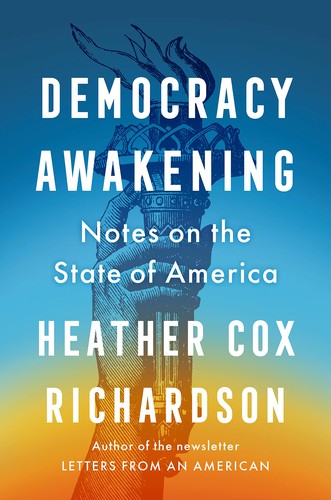Democracy Awakening by Heather Cox Richardson 📚
This book is in part a compilation of the history, ideas, and themes which the author presents in the widely read Letters from an American Substack newsletter, in part an introduction and jumping off place for that newsletter, and in part a strong statement arguing for equality, democracy, and the preservation of the “liberal consensus” as the basis of politics in this country. The writing is clear and direct, arguing that when the federal government acts to help the disadvantaged that society as a whole benefits, rich and poor alike; but when wealth and power is concentrated in the hands of the few, when public programs are curtailed to prevent minorities from benefiting, when the country abandons the principles of democracy and equality, then only the elite few reap the benefits and the rest of us must deal with declining living standards, loss of opportunity, and in the worst cases conflict and war.
The Civil War is the fulcrum on which the narrative turns, the primary example of minority rule and race-based privilege leading to catastrophic consequences. Before the election of Lincoln the federal government was controlled by a minority consisting of enslavers and their enablers, people who thought it not only right but necessary to own other humans, people who claimed that the Declaration was wrong about that “all men are created equal” nonsense. They used many of the same tools still present today to maintain that control: disenfranchisement, the unrepresentative Senate, and the Electoral College; wealth was highly concentrated in the hands of the few, and the vast enslaved population owned literally nothing; the ratio of rich to poor was effectively infinite. But this vast inequality did not lead to prosperity, even for the few; they refused to compromise their addiction to human enslavement, despite a clear majority of the country opposing it, as evidenced by the election of Lincoln, and instead plunged into a bloody and disastrous war.
The book draws many parallels between that time and this, and explores how the same ideas which lead to succession are still present in the current discourse, including the use of violent insurrection to attempt to subvert the results of an election. It does contain some glimmers of hope, tracing some of the more progressive political movements of the past and how they continue to this day, but I don’t feel that I understand how the two political parties transformed over the past century, and in particular how the GOP went from Lincoln to Trump, from abolition to fascism. It is a strange, dark time we live in.
Recommended.

